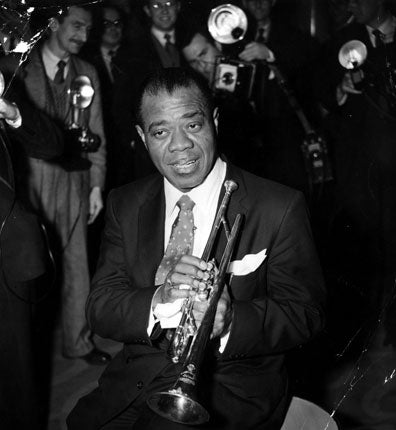Satchmo by Satchmo, Radio 2, Wednesday<br/>British, More or Less, Radio 4, Wednesday
Louis in his own words – so good, you don't want music

Were he around now, I bet that, like Bob Dylan, Guy Garvey, Jarvis Cocker and Ronnie Wood, Louis Armstrong would have his own radio show, and it would be fantastic.
Satchmo by Satchmo explored the miles of reel-to-reel tapes he amassed over the decades at home in Corona, Queens. It was a life-enhancing delight.
There were meetings with the great and good: "The Pope was such a fine little old feller, you know? He said, 'Do you have any children?' and I said, 'No, daddy, but we're working on it.'" There was similar pressure from the visiting English guitarist Sidney Gross, who urged parenthood on him. "Well, I keep putting my nickel in the machine ..." he told him.
He also had nice things to say about some new kids in town: "The Beatles? They're great – they've got a new beat there." I'm not usually one to say this – the more music in music documentaries the better, generally, and Armstrong the musician was undeniably, swingingly great – but I could have done with less music and more from the tapes. The last one we heard was from 1970, not long before Satchmo died: "I never wanted to be any more than I am," he reflected, "and what I don't have, I don't need it. I've always loved and always lived a normal life. Well folks, that was my life and I enjoyed all of it."
As Britain fills up with people, the immigration debate won't go away. In fact, given that during the last Ice Age Britain was empty of humankind, we're all immigrants, and in British, More or Less Tracey Logan explored the genetic side of Britishness. What would the Scots think, for example, if they found out that they're not at all genetically distinct from the English? (I'd quite like to see their faces when they're told.)
The fact is, differences between peoples have little to do with chromosomes and far more to do with cultures that have developed over thousands of years. Logan spoke to a chieftain of the Clan McClean, who aren't at all keen on DNA tests. "We don't quite see how it will help us as a family," he said – i.e. it might lead to the conclusion that there's nothing scientific to distinguish the McCleans from the McClouds.
Logan underwent a DNA test which uncovered a maternal gene most commonly found in Basques and Lapps. As the population geneticist Jim Wilson pointed out, we're just at the start of all this: the first human genome map cost $3bn; soon they'll be about £100. What will it do to us as a species when we accept that we're all very closely related? Depressingly, not that much, I'd wager.
Join our commenting forum
Join thought-provoking conversations, follow other Independent readers and see their replies
Comments
Bookmark popover
Removed from bookmarks